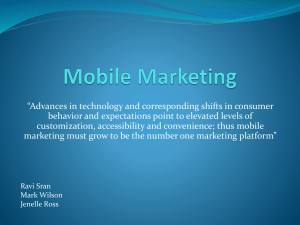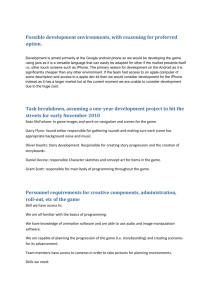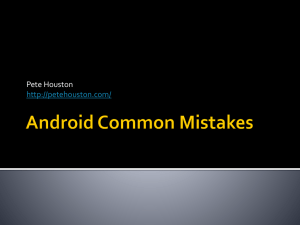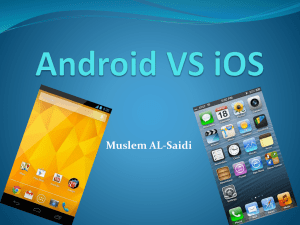File
advertisement
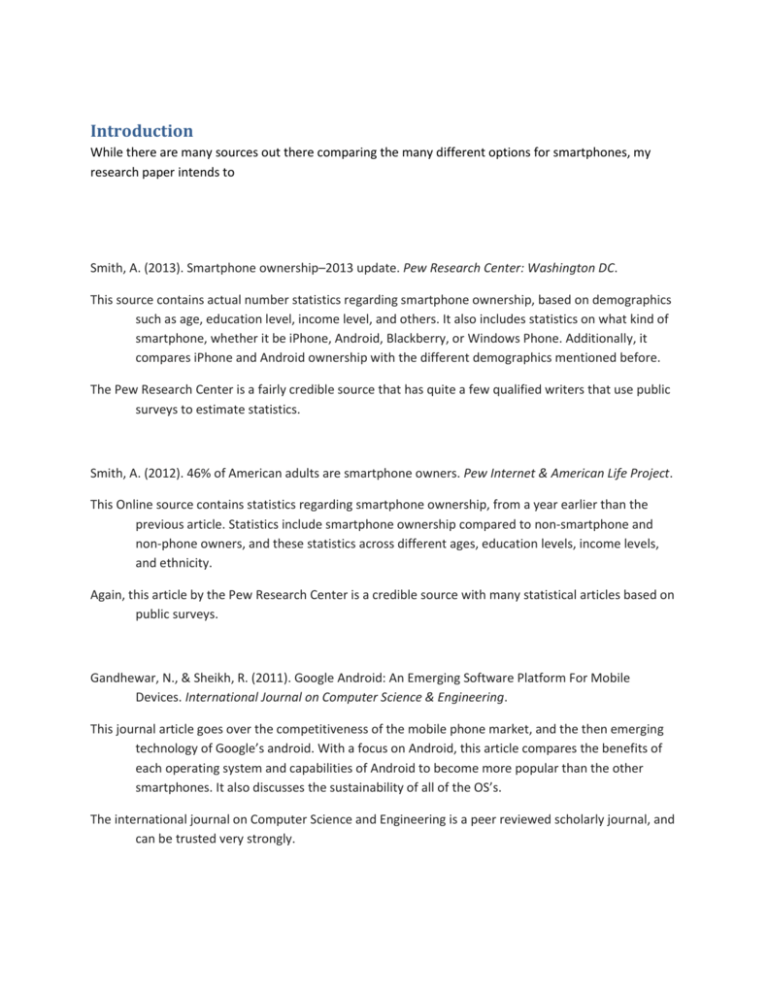
Introduction While there are many sources out there comparing the many different options for smartphones, my research paper intends to Smith, A. (2013). Smartphone ownership–2013 update. Pew Research Center: Washington DC. This source contains actual number statistics regarding smartphone ownership, based on demographics such as age, education level, income level, and others. It also includes statistics on what kind of smartphone, whether it be iPhone, Android, Blackberry, or Windows Phone. Additionally, it compares iPhone and Android ownership with the different demographics mentioned before. The Pew Research Center is a fairly credible source that has quite a few qualified writers that use public surveys to estimate statistics. Smith, A. (2012). 46% of American adults are smartphone owners. Pew Internet & American Life Project. This Online source contains statistics regarding smartphone ownership, from a year earlier than the previous article. Statistics include smartphone ownership compared to non-smartphone and non-phone owners, and these statistics across different ages, education levels, income levels, and ethnicity. Again, this article by the Pew Research Center is a credible source with many statistical articles based on public surveys. Gandhewar, N., & Sheikh, R. (2011). Google Android: An Emerging Software Platform For Mobile Devices. International Journal on Computer Science & Engineering. This journal article goes over the competitiveness of the mobile phone market, and the then emerging technology of Google’s android. With a focus on Android, this article compares the benefits of each operating system and capabilities of Android to become more popular than the other smartphones. It also discusses the sustainability of all of the OS’s. The international journal on Computer Science and Engineering is a peer reviewed scholarly journal, and can be trusted very strongly. Goadrich, M. H., & Rogers, M. P. (2011, March). Smart smartphone development: iOS versus Android. In Proceedings of the 42nd ACM technical symposium on Computer science education (pp. 607612). ACM. While this article doesn’t discuss which Operating System, iOS or Android, is better for consumers, it does discuss which should be taught, which will ultimately determine which OS gets more support. The third-party support determines the depth of their third party applications, which is an important part of using a smartphone and very relevant to consumers. The SIGCSE proceedings of the 2011 symposium is a peer reviewed journal that resulted from a presentation at a symposium. A very credible source. West, J., & Mace, M. (2010). Browsing as the killer app: Explaining the rapid success of Apple's iPhone. Telecommunications Policy, 34(5), 270-286. This article does exactly as advertised – explains Apple’s success with their iPhone. Their initial success was far and beyond completely due to their idea of giving users the “real internet” on their phones, rather than slow, cut down mobile browsing. This opened up opportunities to users not previously existent, and it was a huge hit. It also argues why this is so important and other things that contributed to the success of the iPhone. It also has statistics on iPhone usage compared to other platforms and hardware specs of different Apple products. The international journal of ICT Economy is a peer-reviewed journal. PCs, U. M. (2008). Emerging technologies mobile-computing trends: lighter, faster, smarter. About Language Learning & Technology, 3. This Periodical article goes through a pretty extensive list of mobile-computing devices and compares them. Smartphones, of course, are on the list, and are compared and contrasted thusly. While the article is relatively old considering the relevancy of newer devices to my topic, analyzing the initial trends is important for understanding the support and success of different smartphones. This periodical article is from a fairly credible periodical, however, it is not peer reviewed, so not that reliable. Artman, J. (n.d.). Why Is the iPhone So Popular? Retrieved February 2, 2014, from Chron: http://smallbusiness.chron.com/iphone-popular-27294.html This web article goes over the design, power, multimedia features, and app store of the iPhone, explaining its success. This article was from fairly recently as it talks about statistics from the first quarter of 2011, however, its credibility is questionable. It could easily be biased towards the iPhone, as it doesn't mention any competitors at all. So take all information gathered here with a grain of salt. Chron is a fairly popular but questionably credible source. Bajarin, T. (2012, May 7). 6 Reasons Apple Is So Successful. Retrieved February 3, 2014, from TIME Tech: http://techland.time.com/2012/05/07/six-reasons-why-apple-is-successful/ This web article goes over six reasons why apple is successful. These reasons are: They create products they want to use themselves, they create easy to use products, they keep things simple, they offer good customer service, they only make a product if they make it better, and they stay at least two years ahead of the game. All of these points are valid reasons for success, however, it may be biased. Time is a credible magazine source, whose online articles are presumably similarly credible. Not peerreviewed. Biddle, S. (2013, January 22). Android Is Popular Because It's Cheap, Not Because It's Good. Retrieved February 2, 2014, from Gizmodo: http://gizmodo.com/5977625/android-is-popular-because-itscheap-not-because-its-good This web article argues that Android sells better than iPhone because its cheaper. This is a valid point, and it shows. Android is destroying apple in number of phones sold and a lot of that is not only the high end, powerful, nice to use phones, but the multiple price points that are available for purchase for $100 and less. Additionally, it discusses Android's marketing strategies, including targeting lower-income families and even African-American families. Gizmodo is a popular and respected online source. It is not peer reviewed. Butler, M. (2011, Jan). Android: Changing the Mobile Landscape. Pervasive Computing, IEEE, pp. 4-7. This journal article goes over many aspects of the Android vs. iPhone argument, why Android is catching up and being successful, and prospects for the future having to do with winning over the hearts and minds of not only the consumers, but the third party developers. This is extremely important as it determines app support for both platforms, and people will go where the support and applications are. This article is a little old, which makes it somewhat less relevant. Pervasive Computing is a peer-reviewed journal.

